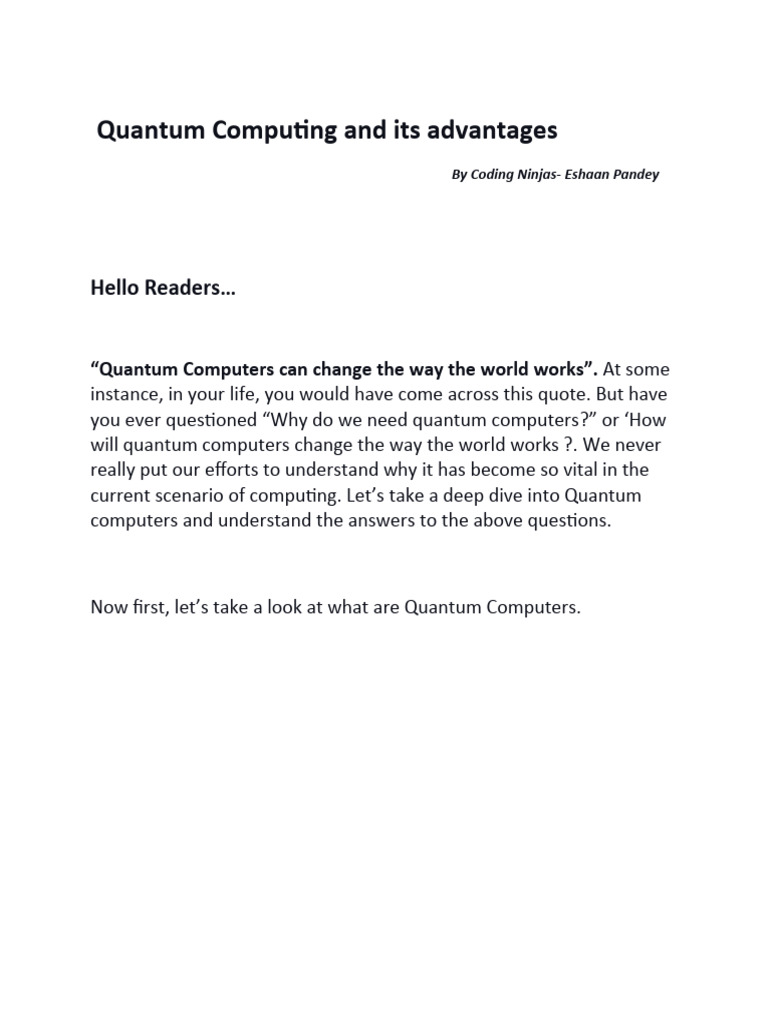Quantum computing stands at the precipice of a technological renaissance, much like the dawn of the Information Age, beckoning its enthusiasts with promises not merely to enhance, but to revolutionize computational paradigms. Like an artist wielding a brush to capture the immutable essence of reality, quantum computation seeks to manipulate the subatomic tapestry of existence, offering advantages that transcend classical limitations. This article elucidates the multifaceted benefits of quantum computing, illuminating its potential in various domains.
At the heart of quantum computing lies the principle of superposition, wherein quantum bits, or qubits, exist in multiple states simultaneously. This characteristic functions akin to a symphony orchestra, producing a more intricate and harmonious melody than the solitary notes of classical bits, which are bound to binary constraints. By harnessing superposition, quantum computing can solve intricate problems at exponential speeds compared to its classical counterparts.
One of the most significant advantages of quantum computing is its unparalleled capability in optimization problems. Industries such as logistics, finance, and telecommunications face challenges that involve myriad variables and constraints, akin to navigating a sprawling labyrinth. Quantum algorithms, such as the Quantum Approximate Optimization Algorithm (QAOA), possess the potential to converge on optimal solutions efficiently, saving time and resources. Imagine a delivery service that, in mere moments, can determine the most efficient route for thousands of packages instead of engaging in exhaustive trial-and-error methods.
Another noteworthy domain influenced by quantum computing is cryptography. The resilience of classical encryption methods hinges on the assumption of computational difficulty—an assumption that quantum computers can shatter. Shor’s algorithm, for instance, can factor large numbers exponentially faster than any known classical algorithm, rendering current public-key cryptography obsolete. Thus, quantum computing invites the need for advanced cryptographic systems rooted in quantum mechanics, such as Quantum Key Distribution (QKD), ensuring secure communication that would elude even the most adept eavesdropper.
Beyond optimization and cryptography, quantum computing plays a formidable role in the realm of materials science and drug discovery. Simulating quantum systems, such as complex molecular interactions, requires vast computational resources that classical computers struggle to provide. Quantum computers, however, can model these interactions with unprecedented precision, akin to discerning the gentle brushstrokes of a master painter. This capability paves the way for hastening the development of novel materials and pharmaceuticals, unlocking new chapters in biochemistry and quantum chemistry.
In finance, quantum computing presents the opportunity to craft sophisticated models for risk assessment and portfolio optimization. Traders operate in a landscape of volatile market conditions, navigating a sea of data replete with uncertainties. Quantum algorithms can uncover correlations and trends within the data, much like a skilled navigator charting a course through stormy seas. By optimizing trading strategies and forecasting market fluctuations, quantum computing could yield a competitive advantage of monumental proportions in the financial sector.
Artificial intelligence (AI) stands to gain significantly from the advent of quantum computing as well. The integration of quantum algorithms with machine learning processes enables enhanced data analysis and pattern recognition. Quantum-enhanced AI could process and analyze vast datasets at speeds currently unthinkable, thus facilitating breakthroughs in various fields, from climate modeling to personalized medicine. Imagine a future wherein healthcare practitioners can analyze a patient’s genetic makeup against an entire database of medical knowledge instantaneously, leading to targeted and effective treatment options.
The profound implications of quantum computing extend into the realm of climate science and environmental research. The urgency to address climate change necessitates advanced models to predict environmental phenomena. Quantum computers can simulate complex climate systems with remarkable fidelity, enabling more accurate forecasts and effective mitigation strategies. By engendering a deeper understanding of the Earth’s climate dynamics, quantum computing acts as an invaluable ally in the pursuit of sustainability and ecological preservation.
Moreover, quantum computing introduces innovative approaches to computationally intensive tasks such as combinatorial problems. These problem types are prevalent across numerous disciplines—ranging from string theory in physics to optimizing supply chains. Classical computers often grapple with tasks that grow exponentially demanding as the problem size increases. Quantum computing, with its inherent ability to explore multiple possibilities simultaneously, offers a glimmer of hope in addressing these seemingly insurmountable problems.
As we navigate this burgeoning landscape, ethical considerations and equitable access to quantum computing technologies must occupy a central position in discussions surrounding its development. The potential of quantum computing is magnificent, yet it poses questions regarding data privacy, economic disparity, and security. Ensuring that the advantages of this revolutionary technology benefit humanity universally is a challenge that must not be overlooked.
In conclusion, the advantages of quantum computing are vast and varied, echoing through numerous sectors and applications. From optimization and cryptography to drug discovery and climate modeling, the unique capabilities of quantum computers paint a vivid picture of a future rife with potential. Just as the invention of the steam engine catalyzed the Industrial Revolution, quantum computing promises to be the engine of a new epoch in computational ability. As we stand at this crossroads, the wisdom lies in embracing these opportunities prudently, ensuring that the advancements benefit society as a whole, thus weaving a richer fabric of technological progress.












